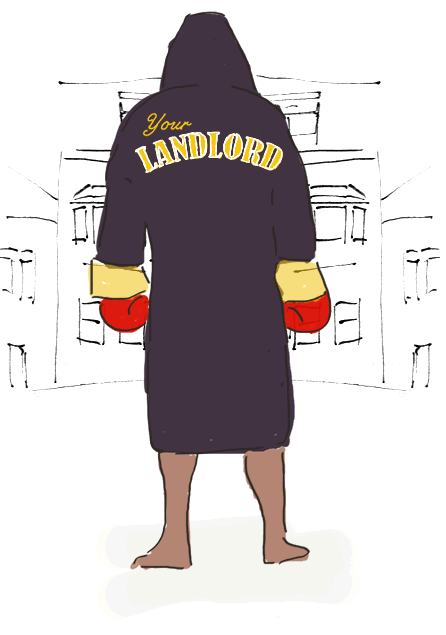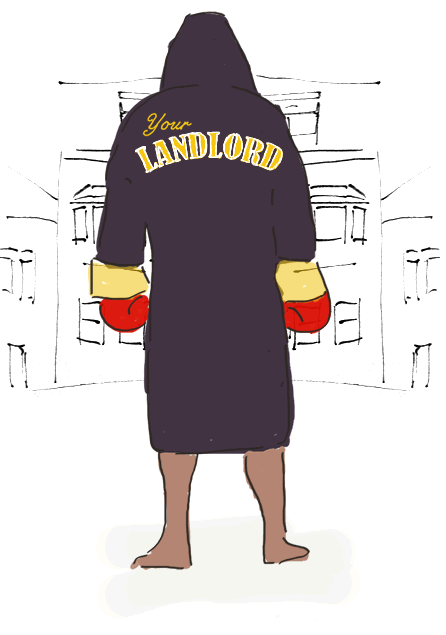When we finally found the beautiful, affordable (if barely) four bedroom Victorian in the Lower Haight, my three roommates and I were too busy basking in new-apartment glory to acknowledge that our landlords were creepy. Like so many tenants, the desperation of apartment hunting in San Francisco kept us from an essential step when finding a new home: a landlord background check. A month and a half into our tenancy our hunch came back to haunt us.
One day the lock on the front door to our apartment stopped working. Anyone who came by could push the door right open. Despite multiple emails and phone calls, our landlords didn’t get around to fixing it until almost a week had passed. We hoped it was an aberration. It soon proved to be the norm. The landlords were pathologically unresponsive and disdainful. Repairs languished. Workmen barged in unannounced.
One morning we received a letter from the previous tenants. Their deposit had been withheld and they were taking the landlords to small claims court. It was then we realized we weren’t dealing with run-of-the-mill neglectful landlords. These guys were ready to use every dirty trick in the book. We finally poked around the Internet. The results were far from comforting. We were in for a battle.

When we first looked at the house, an unctuous representative from the holdings company gave us a tour. He told us that we would probably never even meet the two landlords. They lived in New York. One of the first discoveries on our Internet search was that this man was actually one of the landlords. He had just been using a false name, which, he would later explain in court, he had a habit of doing.
We discovered a 1994 New York Times article in which tenants and housing advocates claimed that the duo exploited AIDS patients, illegally converted SROs, and harassed renters out of apartments so they could hike rates. Housing forums decried our landlords’ sleazy tactics. At the end of the ’90s they moved their operation out West. Bay Area tenants had created a Yelp page filled with reviews like: “WORST HUMAN BEINGS I’VE EVER INTERACTED WITH. SIMPLY EVIL.” And advice like this: “If the scenario of having to deal with this company ever presents itself, you should probably just go and set yourself on fire instead.”
I’ve never been too keen on self-immolation and I wasn’t about to leave a lovely apartment just because it was owned by creeps. We decided to dig our heels in and fight back. To do that we would need help, so we contacted the San Francisco Tenants Union (SFTU).

The SFTU had simple advice: document everything. From then on we sent letters to the landlords describing every unpleasant incident. When they entered unannounced we changed the locks. When they refused to make repairs we called the Department of Building Inspection (DBI). The list of problems mounted. We suffered a gas leak, insufficient heat, and were without doorbell and porch light. Water leaked into the bathroom, the shower seal molded out, our bathtubs clogged because of ancient plumbing.
After eight months of absurdity, my roommate Vasili collected our documents to send a petition to the Rent Board for compensation. Even after everything we’d been through, I was apprehensive. Could we really win? Would we just be encouraging worse treatment? I decided to talk it over with the Tenants Union myself.


The SFTU is housed in a quaint Victorian between 21st and 22nd on Capp Street. The interior is a converted living space plastered with posters from past campaigns for tenant rights. Volunteer counselors provide advice to tenants in the front of the house, while in the back, Ted Gullickson, the director and only full-time employee, organizes the effort to protect SF tenants from the interests of landlords and realtors.
The SFTU is San Francisco’s leading tenant activist group and operates on a shoestring budget powered by volunteers, protests, and leaflets. Ted says the big goals are expanding rent control and halting evictions. Along the way there are smaller battles like restructuring the Rent Board to have more tenant representation. Setbacks follow closely on the heels of victories. Earlier this month the state courts repealed parts of Prop M, a measure the SFTU supported in 2008 to protect tenants against landlord harassment. It’s a game of cat and mouse played out on the ballot and in the court.
After speaking with Ted, I wait my turn for a counseling session and listen to the horror stories of other tenants.
A woman explains how the landlord removed the stove in her apartment after she signed a lease; a mother and son say they are being subjected to continual repairs so that they move out; a young man who paid for a sublet three days ago is being kicked out of the apartment by his roommates. His voice, dry from the long story, cracks as he sits back down. “I just don’t have anywhere left to go,” he says and stares at his feet.
Luke, one of the 30 volunteers, gives straightforward advice: document everything, call the DBI to get a report when repairs aren’t made, read the tenants handbook to know your rights, and petition the Rent Board for monetary compensation.
I’m up next with my 50 pages of emails and DBI notices.


Luke thinks I have a strong case and helps me organize a game plan. There are two available modes for Rent Board hearings: mediation and arbitration. If mediation doesn’t work out and the judge has talked to the parties separately, then a new judge is assigned to arbitrate the case. Luke says I should try to determine if the judge is sympathetic; then if mediation goes sour with the landlord, we can opt for arbitration and retain the judge.
The next task is to work out how much each “reduction in services” is worth. The Rent Board doesn’t award money based on emotional damages or time lost. We have 12 items of various severity on the petition, and not all of them straightforward. What is it worth to live with a dangerous gas leak or a nonfunctioning doorbell? Existential questions indeed.
Vasili and I agree on a total of about $18,000, generated mostly from eight months without appropriate heat and a gas leak. It seems a bit high to me at first, but if we were able to claim emotional damages and time spent, we would win enough in a settlement to purchase a small Greek island. And as Vasili asks, “How much would I have to pay you to live in a room with a gas leak?”
The last decision is whether or not to get legal representation, which the SFTU could help us find. The landlords may have a lawyer, which sounds intimidating, but then again, the Rent Board decision won’t cover legal fees. Our other two roommates will be out of town, but Vasili and I feel prepared enough to go it alone.

A month later the two of us are sitting across from one of the landlords and his lawyer. We muddle through the initial stages of mediation. The judge isn’t impressed by our landlord’s assortment of names, nor his inability to recall specific dates and times. After another half an hour the lawyer casually suggests we each speak with the judge privately to try and work something out. Vasili and I both realize it’s a ploy to buy time and a new judge. We ask to skip directly to arbitration.
I can quickly see how tenants are overwhelmed by this part of the hearing. As soon as the mic goes on, the judge adopts a more formal speech. Her only objective is to obtain proof from us that the services were inadequate, that we gave the landlord proper notice, and that we had the dates for which the services remained unprovided. Fortunately, we came prepared. Without our painstaking record of emails, letters and DBI reports, we would have had no case.

In our 4 ½-hour time slot we make it through only half of the items in the petition. We are forced to wait a month to discuss the remaining issues. In the second meeting, the landlord brings in a representative from the heating company to make a confusing testimony about our inadequate, leaky gas heaters. We conclude by saying we hope future tenants don’t have to go through what we did just to get a few repairs done in a timely matter.
Three months later the board awards us around $9,000, equivalent to 2 1/2 months rent and about half of what we were petitioning. The board also issues an ongoing reduction of $500 a month until the last DBI report regarding the heat is abated. The landlords immediately appeal a few thousand dollars from the decision. The Rent Board decides to issue another hearing, which is yet to be scheduled. Regardless of the appeal result, we will have finally succeeded in obtaining some monetary reimbursement for our landlord’s systematic abuse of our rights.
More than joy, we felt relief after receiving the decision. The entire process has been painstakingly drawn-out and emotionally taxing. At every step of the process, the odds were stacked in the landlord’s favor: If we had not documented the events, called the DBI, organized a Rent Board petition, and had the wherewithal and will to express ourselves coherently in writing –and verbally in front of a judge — we would have never succeeded in protecting our rights. For this reason we have decided to set aside a portion of our settlement and donate it to the Tenants Union. Without the SFTU’s valuable work our case would never have been possible.

If you are being mistreated by your landlords, visit the SF Tenants Union and learn your rights. Document everything and don’t be afraid to take a trip to the Rent Board. There are no penalties if you fail to prove your case. If you just want to get involved in tenant rights, you can donate or volunteer at the SFTU.
Design: Wes Mitchell







